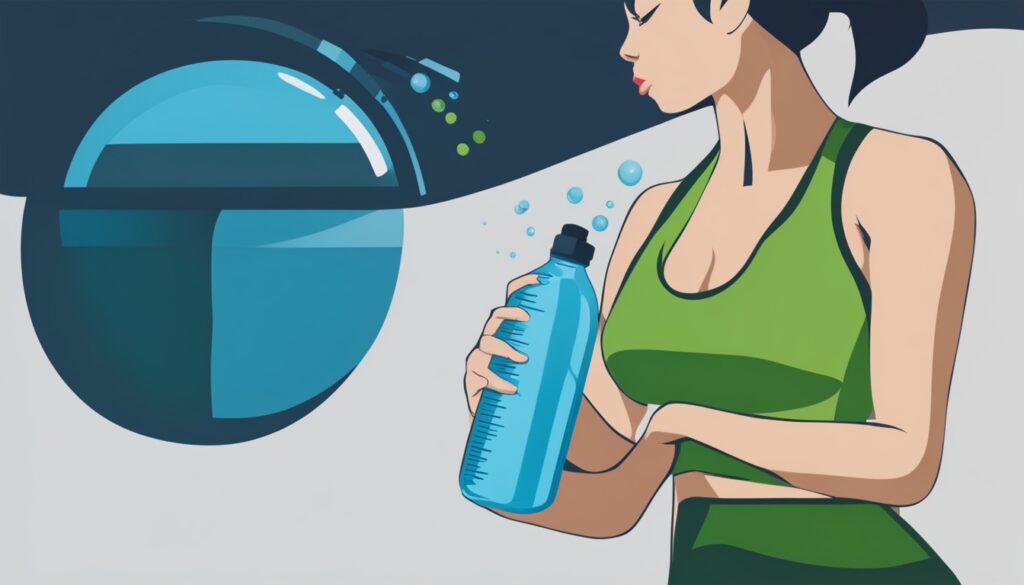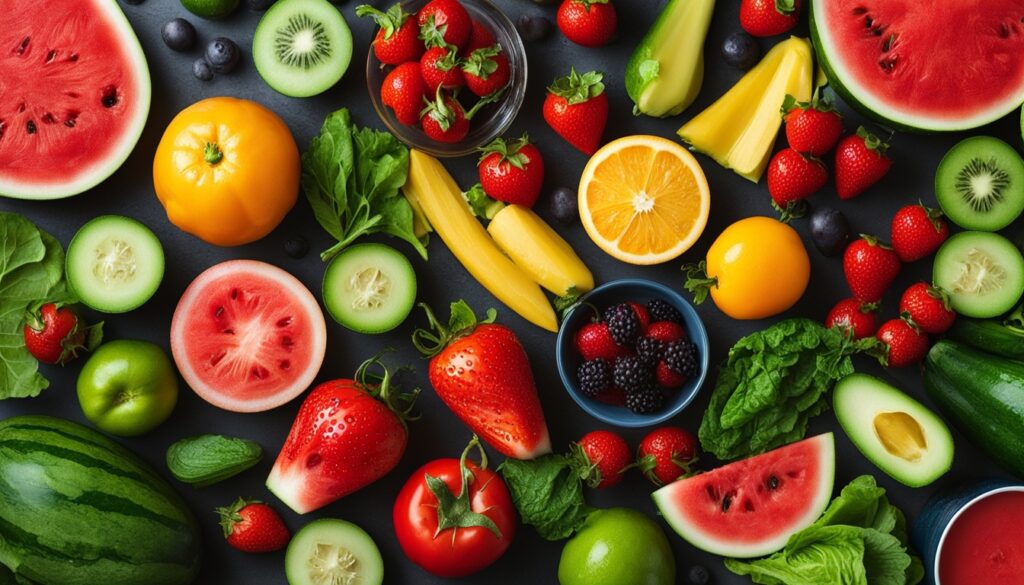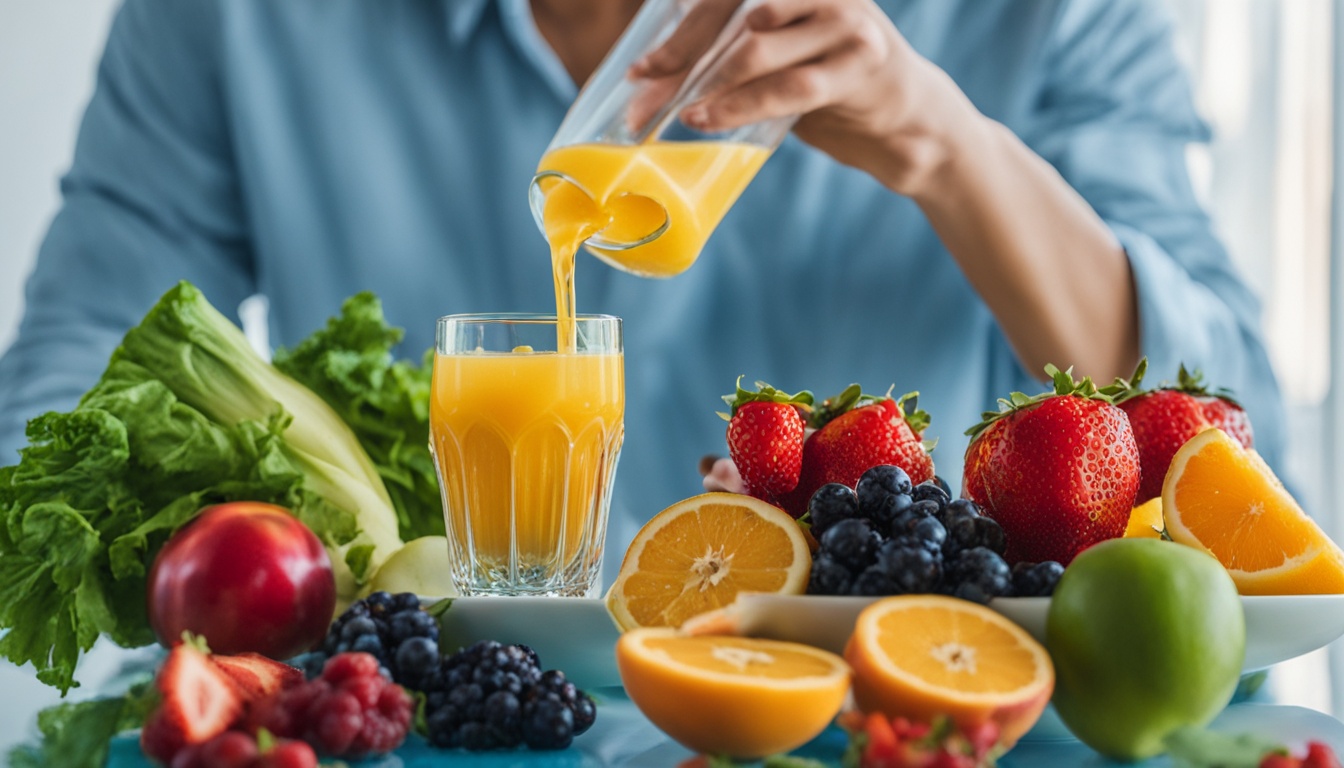Hydration is a foundational element of any diet plan, particularly when it comes to weight loss and overall health. Drinking water before meals can contribute to a significant reduction in unnecessary caloric consumption. Studies have shown that consuming a glass of water before meals can lead to consuming an average of 75 fewer calories per meal, which can result in a reduction of 27,000 calories per year. Recognizing the role of water in signaling fullness can preclude overeating, making it a strategic approach for those on a water fasting for weight loss.
Including water-rich foods like lettuce, which consists of 96% water, and watermelon, composed of 91% water, can support hydration and help maintain a high metabolism. Broccoli, with its 90% water content, and yogurt, containing 85% water, are also excellent additions to your diet. Drinking water for weight loss can lead to improved metabolism, as some studies suggest that drinking about 2 cups of warm water can increase metabolic rates by an average of 30% within 10-40 minutes. These findings highlight the power of using water effectively in dietary plans.
Key Takeaways
- Drink a glass of water before meals to consume 75 fewer calories per meal.
- Incorporate water-rich foods like lettuce (96% water) and watermelon (91% water) for better hydration.
- Drinking about 2 cups of warm water can boost metabolic rates by up to 30%.
- Replace sugary beverages with water to reduce calorie intake significantly.
- Maintaining proper hydration can help prevent overeating and promote weight loss.
The Importance of Hydration for Health
Staying properly hydrated is essential for maintaining overall health and well-being. Ensuring adequate water intake can support a variety of critical physiological functions, providing numerous benefits of water diet for both physical and cognitive health.
Why Hydration Matters
The human body, comprising about 60% water, relies on hydration to perform a myriad of functions. Proper water intake helps regulate body temperature, lubricate joints, and transport nutrients across cells. A 2008 study highlighted that supplementing water intake in children improved cognitive function, emphasizing the significant role of hydration in mental clarity. Consuming adequate water also supports physical performance, shown by a 2004 study on the effects of hypohydration during exercise.
According to data from 2005, the hydration status in the United States revealed a crucial insight into the importance of maintaining fluid balance. Recognizing how to diet with water can be particularly effective for those aiming to enhance physical performance and cognitive function.
Health Risks of Dehydration
Dehydration occurs when the body loses more fluid than it takes in, a condition that can lead to a range of health problems. Mild dehydration, such as losing 1–3% of body weight in fluids, can impair brain function and energy levels. A study from 2001 reported on blood and urinary measures of dehydration, underscoring the critical thresholds at which bodily functions begin to deteriorate.
Serious health risks include fatigue, muscle cramps, low blood pressure, and rapid heart rate. Long-term dehydration can escalate into severe conditions such as organ failure. Data from 2005 showed a significant prevalence of plasma hypertonicity among older adults, pointing toward age-related risks.
For those keen on weight management, understanding the benefits of water diet can also aid in preventing conditions like kidney stones, as higher water intake lowers the risk. Additionally, drinking water before meals can amplify satiety, promoting weight loss; research indicates that dieters who incorporate this practice may lose up to 44% more weight over 12 weeks.
The water intake for weight loss impacts more than just shedding pounds. Increased water consumption can relieve constipation, enhance mood and concentration, and reduce the likelihood of experiencing severe migraines, as evidence suggests from various studies.
Benefits of Water Diet for Weight Loss
Adopting a water diet can be a beneficial strategy for those aiming for weight loss. Water plays a crucial role in controlling hunger and enhancing metabolism, making it easier to achieve weight management goals.

Feeling Full and Reducing Hunger
One of the key benefits of understanding how to diet with water is its ability to promote satiety. Drinking water before meals can create a sense of fullness that helps reduce overall caloric intake. This pre-meal hydration strategy is proven to be effective in minimizing overeating, making it easier for individuals to stick to their dietary plans.
Boosting Metabolism
Another significant aspect of a water diet is its capability to boost metabolism. When it comes to drinking water for weight loss, consuming ice-cold water can elevate the metabolic rate. This is because the body expends extra energy to heat the water to body temperature, resulting in increased calorie burn. Studies have also linked water fasting with improved sensitivity to insulin and leptin, positively impacting overall metabolism.
In essence, incorporating water into your diet not only aids in maintaining hydration but also makes substantial contributions towards weight management and metabolic health. Understanding the dynamics of how to diet with water can thus empower individuals to make informed choices towards achieving their weight loss goals.
How to Diet with Water
Dieting with water can be an effective strategy for managing weight and improving overall health. By incorporating water diet strategies into everyday routines, individuals can experience multiple benefits of water diet methods.
Pre-Meal Hydration Strategy
The pre-meal hydration strategy involves consuming water before meals to promote a sense of fullness, preventing overeating. Drinking water before meals can help reduce caloric intake, thereby aiding in gradual and sustainable weight loss, as recommended by the Centers for Disease Control and Prevention (CDC). This is regarded as the best way to use water for dieting effectively as it leverages the natural feeling of fullness that water provides.
Replacing High-Calorie Beverages
Swapping high-calorie beverages with water is another key aspect of effective water diet strategies. High-calorie drinks like sugary sodas, energy drinks, and alcoholic beverages can contribute significantly to an individual’s daily calorie intake. By replacing these with water, one can drastically reduce unnecessary calorie consumption, making it the best way to use water for dieting. Opting for water not only cuts down on calories but also supports hydration, which is crucial for various bodily functions.
| Beverage Type | Calories per Serving | Water | Benefits |
|---|---|---|---|
| Soda | 140 | 0 | Reduced calorie intake |
| Energy Drink | 150 | 0 | Improved hydration |
| Alcoholic Beverage | 100-200 | 0 | Better weight management |
Employing these water diet strategies can greatly assist in maintaining an efficient metabolism and supporting overall health. Leveraging the benefits of water diet methods, like the pre-meal hydration strategy and replacing high-calorie beverages, can foster sustainable weight loss and improve quality of life.
Water-Rich Foods to Include in Your Diet
Incorporating water-rich foods into your water diet plan is an impactful way to enhance hydration and improve overall health. These hydrating foods not only help you stay hydrated but also provide essential vitamins and minerals beneficial for the body. Here are some key water-rich foods to consider:

Fruits like watermelon, strawberries, and oranges are excellent choices. Watermelon stands out with an impressive water content of 92%, while strawberries also deliver a high water content of 91%. Both fruits are low in calories and packed with antioxidants and essential nutrients. Another great option is cantaloupe, which has a water content of 90%, and is rich in fiber and vitamin A.
Vegetables are equally vital in a water diet plan. Cucumbers, for example, are composed of 95% water and are a low-calorie source of vitamins K and potassium. Lettuce, boasting a water content of 96%, provides fiber, folate, and vitamins K and A. Similarly, zucchini, with a water content of 94%, offers essential nutrients and antioxidants.
Beyond fruits and vegetables, incorporating broths and soups, which have a water content of 92%, can aid in hydration and weight loss. These hydrating foods contribute to your overall water intake while providing valuable nutrients and supporting your health goals.
| Food | Water Content (%) | Benefits |
|---|---|---|
| Watermelon | 92% | Low in calories, rich in vitamins |
| Strawberries | 91% | Provides fiber, antioxidants, essential vitamins |
| Cantaloupe | 90% | Rich in fiber and vitamin A |
| Cucumber | 95% | Low in calories, contains vitamins K and potassium |
| Lettuce | 96% | Source of fiber, folate, vitamins K and A |
| Zucchini | 94% | Provides essential nutrients and antioxidants |
| Broths & Soups | 92% | Aids in hydration and weight loss |
In summary, by incorporating these water-rich foods into your diet, you can stay hydrated while gaining essential vitamins and minerals. This approach aligns perfectly with a comprehensive water diet plan designed to improve overall well-being.
Creating a Water Diet Plan
Establishing a water diet plan involves setting measurable goals, incorporating hydration with meals, and diligently monitoring progress. These steps can help you make the most of how to diet with water effectively.
Setting Your Daily Water Goals
To begin with, it’s essential to tailor your daily water goals to your individual needs, activity level, and environment. Experts suggest drinking half your body weight in ounces of water each day. For athletes, an additional 1.5-2.5 cups of water is recommended. These water diet tips ensure that you meet your hydration needs while aiming for weight loss.
Incorporating Hydration into Meals
Adding hydration to your meals is another effective strategy. You can achieve this by opting for water-rich foods such as soups and broths. High water-content fruits and vegetables, like watermelon, cucumbers, and oranges, are excellent choices. Ensure that you are also consuming water with your snacks to maximize the benefits of water fasting for weight loss.
Monitoring Your Progress
Consistency is key when following a water diet plan. Regular tracking of your water intake and weight loss progress can help keep you on track. Studies indicate that those who document their food and water intake tend to lose more weight. Adopting fitness tracking bracelets or journaling can provide you with valuable insights into your hydration habits and other aspects of your water diet tips.
- Set daily water goals tailored to your needs.
- Incorporate hydration into every meal.
- Monitor progress diligently.
| Water Intake Recommendations | Details |
|---|---|
| General | Half your body weight in ounces each day |
| Athletes | 1.5-2.5 cups beyond the general recommendation |
| During Fasting | 2-3 liters daily |
Additional Tips for Staying Hydrated
Ensuring proper water intake for weight loss and overall health means embracing more than just the act of drinking water. Adopting a lifestyle that naturally promotes staying hydrated is crucial.
One effective approach is to follow a set drinking schedule. By consistently sipping water throughout the day, rather than waiting until you feel thirsty, you can maintain more stable hydration levels. Carrying a reusable water bottle makes this process more convenient and eco-friendly.
Flavored water can add a touch of excitement, encouraging higher water intake for weight loss and better enjoyment. Adding slices of fruits like lemon, cucumber, or even fresh herbs such as mint can make water more appealing without adding calories.
- Adhere to a drinking schedule
- Carry a reusable water bottle
- Experiment with flavored water using fruits and herbs
- Consume decaffeinated teas
- Include water-rich foods and liquids in your diet
Decaffeinated teas and low-fat dairy products also contribute to your hydration goals. Incorporating soups as starters can help to kickstart your meal with added fluid intake.
Listening to your body is critical. Physical cues such as rarely feeling thirsty and the color of your urine – aiming for colorless or light yellow – can serve as reliable indicators that your hydration strategies are effective. Remember that approximately 20% of daily liquid intake comes from food, so integrating water-rich foods such as fruits and vegetables is beneficial.
Specific groups, including infants, young children, outdoor workers, exercisers, and older adults, have higher risks of dehydration. These groups should pay extra attention to their hydration routines to ensure optimal health and function.
| Recommended Daily Water Intake |
|---|
| Women: 11.5 cups or 92 ounces |
| Men: 15.5 cups or 124 ounces |
Conclusion
Incorporating a water diet plan is a potent strategy for achieving weight loss and boosting overall health. Numerous studies underscore the benefits of water diet for weight reduction, noting that weight loss was approximately 2 kg greater in participants who increased their water intake compared to those who didn’t. Further, the water group experienced a 44% greater decline in weight over a 12-week period versus their non-water-consuming counterparts.
A water diet clearly contributes to reduced energy intake. At baseline, those who practiced water preload consumed fewer calories (WP 498 ± 25 kcal) compared to the no preload condition (NP 541 ± 27 kcal). Although this difference wasn’t significant at 12 weeks, epidemiological studies indicate that energy intake was about 9% lower in water drinkers, equating to a reduction of about 194 kcal per day. Additionally, increasing daily water consumption by at least 1 liter in overweight women correlates with an additional weight loss of around 2 kg over a 12-month period.
Laboratory-based studies affirm that water consumption can reduce hunger and promote feelings of satiety. For example, water consumed with meals reduces energy intake and boosts fullness in both overweight/obese middle-aged and older adults. Integrating water-rich foods into one’s diet, establishing daily water goals, and consistently choosing water over high-calorie beverages can effectively enhance weight loss outcomes. Through a conscious and strategic approach to hydration, individuals can leverage the best way to use water for dieting to reach their health and weight objectives effectively.




